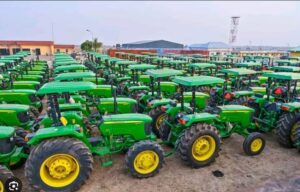
Dry season farming cycle: ThriveAgric targets production of 300,000MT grains
In its second phase of the distribution of agricultural inputs, ThriveAgric, Nigeria’s leading agricultural technology company is targeting the production of over 300,000MT of grains by empowering over 100,000 smallholder farmers.
In a statement, ThriveAgric said it would provide farmers with irrigation facilities, drought-resistant input, access to technology, storage, and premium markets to help optimise output in this farming cycle.
The flag-off of the second phase was announced at an event in Jigawa state, Nigeria. The event brought together various stakeholders including financial institutions, government officials, farmers, and representatives of the farming communities from Jigawa, Bauchi, and Kano.
Conversations centred on the challenges and opportunities of crop cultivation during the dry season. Participants shared valuable insights on optimising crop yields, implementing effective water management, and developing coping mechanisms for the drought conditions often associated with this period. Smallholder farmers encounter challenges during the dry season, stretching from August to September in the South of Nigeria and September to April in the North.
With sparse rainfall and high temperatures, dry-season farming is extremely dependent on irrigation- access to water sources and drought-resistant seeds become crucial, affecting food security. According to the World Bank, only 1 percent of Nigeria’s agriculture is irrigated, and expanding and optimising irrigation infrastructure is key to increasing sectoral productivity.
Speaking on the significance of the dry season to Nigeria’s agriculture, Oshone Anavhe, Vice President, Operations at ThriveAgric said, “In Sub-Saharan Africa, approximately 95 percent of food production relies on rainfed agriculture. The dry season however remains mostly under-utilised for farming due to the absence of necessary infrastructure and widespread unavailability of drought-resistant inputs. For this 2023/2024 farming cycle, ThriveAgric is leveraging partnerships to impart thousands of smallholder farmers, especially those in the wheat, rice and maize value chain, by providing them with access to technology, irrigation facilities, drought-resistant input and premium markets. If harnessed at national scale, dry season farming has the potential to jumpstart food sufficiency in Nigeria, therefore we call on the government to invest in enabling infrastructure that would in turn attract investors and engage more farmers for dry season farming.”
Regional Manager, Sterling Bank, Matthew Omega commented, “We believe in the transformative power of agriculture to drive economic growth and sustainability. Our collaboration with ThriveAgric exemplifies our commitment to providing innovative and accessible financial solutions for farmers. By joining forces, we aim to empower smallholder farmers, and the agricultural communities, promote responsible financial practices, and cultivate a future where prosperity and sustainability co-exist.”
In line with its mission to build the largest network of profitable farmers, over the years, ThriveAgric has utilised strategic partnerships with both private and government institutions to implement initiatives that directly improve the social condition and economic prospects of hundreds of thousands of smallholder farmers in Nigeria. By providing farmers with access to irrigation facilities during the dry season, ThriveAgric farmers are able to 2x or 3x their regular yield thereby increasing their profitability, positively impacting their standard of living while also boosting food security in the country.



